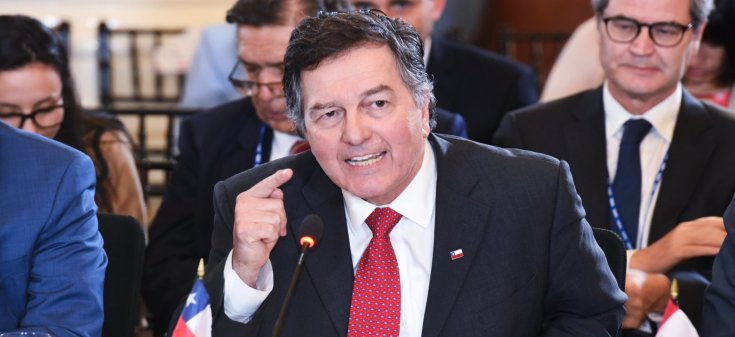Foreign Minister Ampuero intervenes in the OAS Assembly and gives energetic response to his Venezuelan counterpart

The Minister of Foreign Affairs, Roberto Ampuero, addressed the plenary session of the 48th OAS General Assembly, held on Monday in Washington, USA. On that occasion, the Foreign Minister replied forcefully to an intervention by his Venezuelan counterpart, Jorge Arreaza, sparking applause from the plenary.
Opening his speech, Minister Ampuero stressed that the OAS is 70 years old, which allows us to highlight achievements. But, at the same time, he stated that "the reality we face today must be a clear warning against complacency".
In this regard, the minister addressed the situation in Nicaragua, calling on the Nicaraguan authorities to "stop the acts of force, put an end to the confrontation and escalation of the crisis, which has so far claimed the lives of dozens of people and left hundreds injured".
He also reported on the Gender Equity Agenda proposed by President Sebastián Piñera and suggested to the OAS the exchange of experiences and the analysis of new challenges related to the incorporation of the gender perspective in entrepreneurship and public and private business.
The head of Chilean diplomacy also referred in his speech to the situation in Venezuela, one of the central points of discussion at this year's General Assembly.
In this context, he highlighted the coordinated work within the Lima Group and the letter sent on Sunday by President Sebastián Piñera to OAS Secretary General Luis Almagro. In it, the president said it is necessary that the conclusion of the Panel of Experts, which raises possible crimes against humanity in Venezuela, be addressed to the Prosecutor's Office of the International Criminal Court.
"As President Sebastián Piñera said, due to an ethical imperative, we cannot remain silent in the face of this critical situation," said the minister, who added that "we call for the application of the Inter-American Democratic Charter and, at the same time, for other measures that, without affecting the Venezuelan population, will make the government of Caracas listen to the clamour of its people.
In addition, he stated that "Chile, because of this ethical imperative, has offered its support to Venezuelan democrats to contribute in two stages, which require broad agreements: the transition towards the restoration of democracy, and a later phase focused on a project for the future of all Venezuelans for their economic and social development. We offer, we do not impose, we offer the experience that has a first stage of a transition to democracy, a second stage that is a democracy of agreements between all sectors of a country, from left to right," said the Chancellor.
After his speech, the Venezuelan Foreign Minister, Jorge Arreaza, asked for the opportunity to respond to Minister Ampuero. In the face of this, the head of Chilean diplomacy made use of his right of reply. "It is very interesting to listen to the Venezuelan Foreign Minister and to listen to his epithets and the disqualifications he uses towards the representatives of different States and governments here present and towards this institution," he said.
And he added that "if this is the way in which Foreign Minister Arreaza treats people who are diplomats, who represent other states, other governments and being in a third country, imagine how he treats Venezuelans, those under his power, those who do not have a different passport, those who are inside the country suffering from hunger, hardship".
Minister Ampuero added: "if anyone here in this room ever doubted whether there was a dictatorial, authoritarian or democratic government in the case of Venezuela, I believe it has been resolved, nobody here would want, after hearing this, to live under the rule of this Chancellor. Because if you treat us like this, imagine how he treats the people of Venezuela".
"This minister perfectly represents the dictatorial regime of Venezuela, he represents it perfectly, because he is incapable of accepting any argument. He is incapable of recognizing that the other may be right, it cannot be".
Response to Bolivia
During his first speech, Foreign Minister Ampuero also responded to an intervention made by his Bolivian counterpart, Fernando Huanacuni.
"The Bolivian Foreign Minister, clearly exceeding the scope of this organization's competence, has referred to a strictly bilateral issue with Chile. The reality is that it is not appropriate to bring it up, given that it is an issue that Bolivia has unilaterally taken to the International Court of Justice in The Hague. I reaffirm that in the bilateral relationship between Chile and Bolivia there are no pending territorial issues, sovereignty was definitively resolved by the 1904 Treaty of Peace and Friendship that has brought stability, peace and cooperation in many areas between Bolivia and Chile," he said.
In this context, he added that "our government, far from refusing to seek a constructive bilateral relationship, has always offered fraternal dialogue on issues of interest to both nations. The basis for this, of course, lies in unrestricted respect for the 1904 Treaty. The hemispheric community is witness to Chile's willingness to have a positive relationship with Bolivia and to look to the future. It is a call that we reiterate here".











